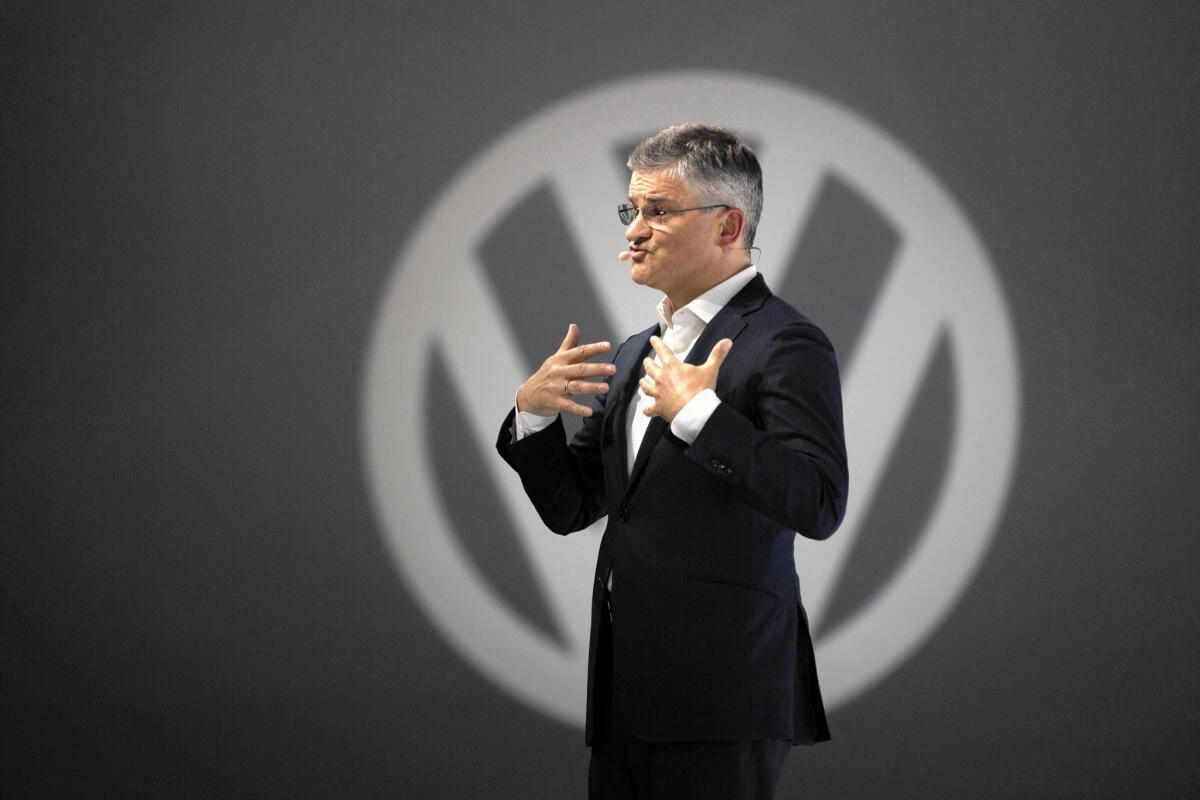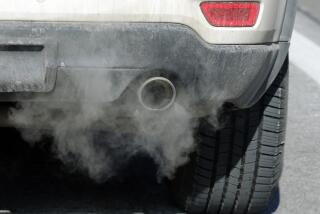Volkswagen diesel scandal threatens to ruin its credibility and value

The expanding Volkswagen diesel emissions scandal now includes 11 million vehicles worldwide and has severely damaged the giant automaker’s credibility and market value.
The company’s stock tanked again Tuesday as the automaker announced it would set aside $7.3 billion for recalls and “other efforts to win back the trust of our customers.” Its shares have lost a third of their value since Friday and more than half since April.
The company’s admitted cheating on U.S. emissions tests marks only the latest scandal to envelop a giant automaker, complete with a criminal investigation, civil lawsuits and the threat of enormous fines. But VW’s problems differ in striking ways from the safety investigations into General Motors, for defective ignition switches, and Toyota Motor Corp., over unintended acceleration.
Though no one was injured or killed by its actions, Volkswagen may suffer even more financial damage — its regulatory fines alone could total up to $18 billion, or $37,500 per car sold in the U.S. Compare that to fines of $900 million for GM and $1.2 billion for Toyota, both negotiated through settlements.
More to the point, VW’s alleged crimes appear premeditated and carefully plotted rather than resulting from negligence, incompetence or bureaucracy. The company lied to regulators for more than a year before admitting the digital deception.
NEWSLETTER: Get the day’s top headlines from Times Editor Davan Maharaj >>
At a New York promotional event Monday night, Volkswagen’s U.S. chief executive, Michael Horn, offered no excuse for the automaker’s conduct.
“We have totally screwed up,” he told attendees at a Brooklyn gathering to launch the new Passat. “Our company was dishonest with the EPA, and the California Air Resources Board and with all of you.”
The brazen nature of VW’s action — installing a software “defeat device” to change engine performance during testing — has enraged once-loyal VW customers. Owner Bob Merlis, a music industry publicist, told The Times he was looking to add a second Volkswagen diesel last week when the story broke.
“I went shopping for a new one, the Golf Sportwagen, but that’s so off the table now,” Merlis said. “I don’t want to do business with those criminals.”
Merlis loved the car for its high mileage and advertised “clean diesel” technology. He felt particularly angry because he had persuaded three friends to buy VW diesels.
“I feel completely used,” he said, “because I proselytized for it.”
Such hardened consumer attitudes will not be easy to change, said Larry Dominique, executive vice president of the online car buying service TrueCar.
“You can spend decades building a brand and wipe it out in a heartbeat — that’s the biggest risk to VW,” he said. “The fact that they set aside $7 billion shows the magnitude of their concern.”
The company’s stock had fallen steadily from a high of $262.84 in April to $183.57 on Friday. After the cheating allegations became public, the stock dived to close at $123.80 on Tuesday.
Volkswagen is the world’s largest automaker. But its performance had already suffered before the cheating scandal broke last week, particularly in the two markets key to its future growth: China and the U.S. Sales of all brands have slowed in China amid an economic downturn, and the country accounts for as much as a third of VW’s sales and 41% of its profits, according to an analysis by AlixPartners.
In the U.S., VW’s outdated models have led to a loss in market share, which has fallen from a high of 3.5% in July 2012 to only 2.3% in the same month this year, according to data supplied by TrueCar.
Now the company has ordered dealers to stop selling new and certified diesel models on lots, where they will sit — depreciating — until dealers can modify the cars and legally sell them again.
Getting owners to fix the cars may be tougher. Consumers often don’t get around to getting recall work performed at dealerships — even for safety issues. And the emissions fix may reduce performance or fuel economy, the main selling points of diesel cars.
In California — which has the nation’s toughest emissions standards and where about 15% of Volkswagen’s affected diesel vehicles were sold — the Air Resources Board and the Department of Motor Vehicles will require owners to prove they made the fix before renewing their state registration.
VW faces a far more daunting — and costly — set of legal problems. Already, several lawmakers have called for special investigations into VW’s practices, among them U.S. Sen. Bill Nelson (D-Fla.), the top Democrat on the Senate Commerce Committee, and New York Atty. Gen. Eric T. Schneiderman.
------------
FOR THE RECORD
Sept. 22, 9:40 p.m.: An earlier version of this article incorrectly identified New York Atty. Gen. Eric T. Schneiderman as U.S. Atty. Gen. Eric T. Schneiderman.
------------
Multiple lawsuits and class-action lawsuits have also been filed, in multiple jurisdictions.
SIGN UP for the free California Inc. business newsletter >>
In Germany, the company’s chief executive, Martin Winterkorn — who has been in charge of the VW brand for the duration of the time the deception has taken place — said he was “endlessly sorry” for having betrayed consumer trust in his company, in a video released by VW. He laid the blame on the “terrible mistakes of a few people,” whom he did not identify. Winterkorn has resisted calls for his resignation.
Volkswagen’s diesel woes began after European regulators noticed discrepancies between emissions and performance test results and drivers’ real-world experiences.
An American institution, the Center for Alternative Fuels, Engines and Emissions (CAFEE) at West Virginia University, was eventually hired to perform emissions tests on several German cars. The group spent several months in late 2013 and early 2014 studying a Volkswagen Passat, Volkswagen Jetta and BMW X5. They measured emissions on a dynamometer and then on the road, using a portable testing device carried in the vehicles’ trunks.
“The results showed the VW vehicles to be higher in real-world emissions by 15 to 30 times,” said Dr. Arvind Thiruvengadam, a professor engaged in the study.
The VW revelations are not the first major case of a manufacturer cheating on emissions tests for diesel engines. More than a decade ago, government officials reached a $1-billion settlement with seven diesel engine manufacturers whom the EPA had charged with using similar devices that illegally bypassed emission control equipment.
The manufacturers, which built engines for tractor-trailers, agreed to pay $83.4 million in fines, $109.5 million to fund research into clean fuel projects, and at least $850 million to produce new, cleaner engines.
The West Virginia laboratory that caught VW cheating was built with money from those fines.
Times staff writers Jerry Hirsch and Samantha Masunaga contributed to this report.
ALSO
Healthcare costs rise again, and the burden continues to shift to workers
Brian Williams makes no-nonsense return on MSNBC with pope coverage
Xi Jinping and Narendra Modi turn to U.S. for investment. How will it play out?







